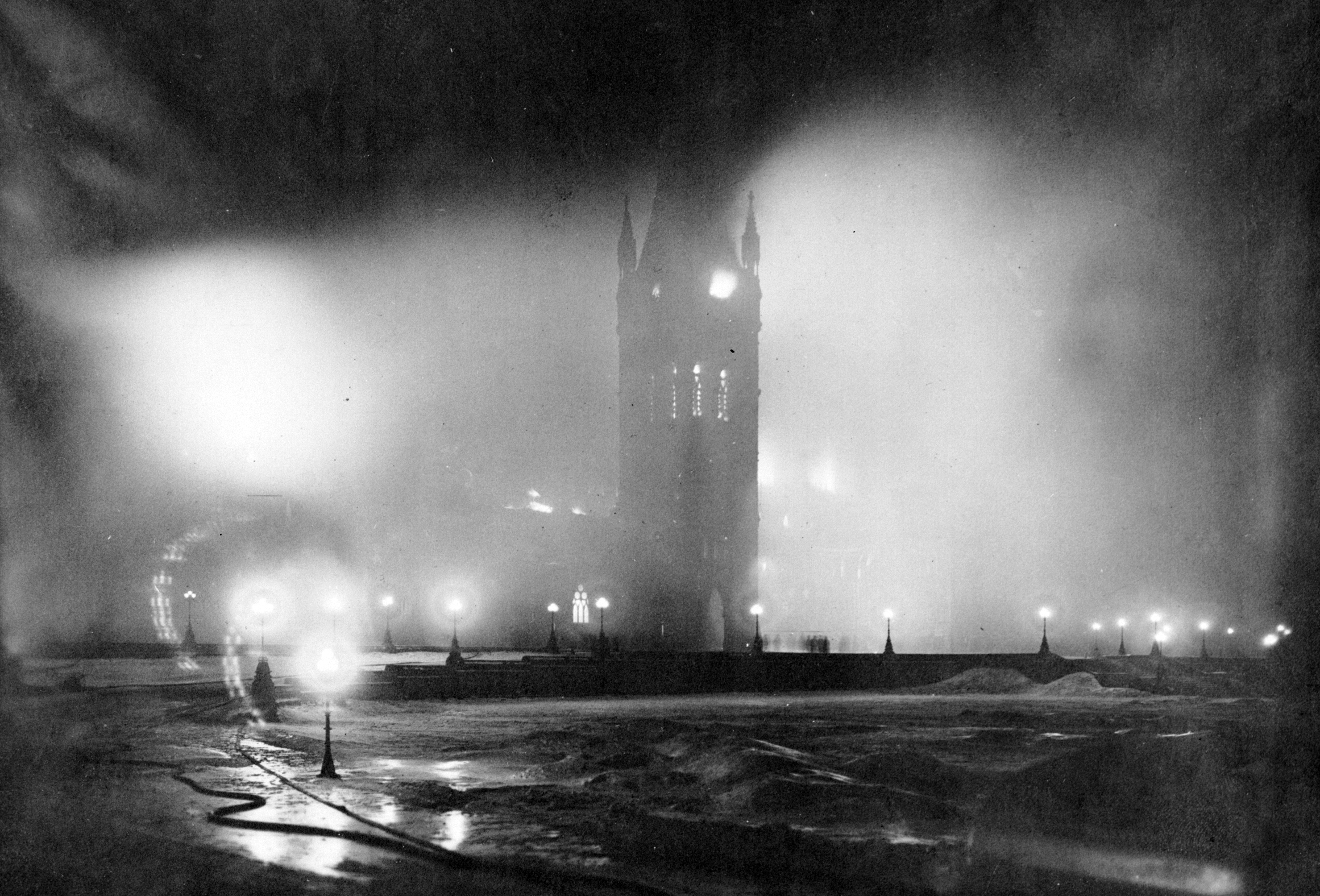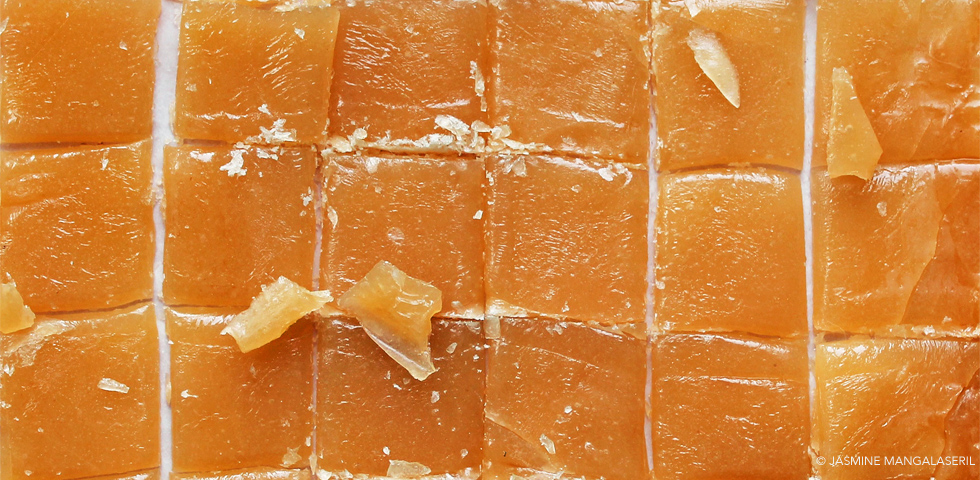
Burning down the House
Chatter about what witnesses saw, didn’t see, thought and surmised propelled rumours about enemy saboteurs setting Parliament Hill alight. Some saw suspicious-looking strangers hanging about the Hill. Others theorised accelerants and fuse lengths for a quick and hot blaze. The American Department of Justice knew something was afoot, but stayed mum. A foreigner with a foreign accent was not only in Ottawa, but he also watched the fire before he tried to flee the country by train: in the wee hours authorities stopped the train at Windsor, Ontario, and found the incriminating evidence of a postcard of the now-destroyed buildings in his pocket. While it was more than enough proof to haul him off for questioning, reality stepped in and the Belgian music director was released and allowed to continue his way to Chicago.
Officials quelled rumours of foreign malfeasance and were quick to declare the fire an accident. It may have been a careless smoker amongst the newspapers, magazines and other combustibles in the wood panelled Reading Room. Besides, fires on the Hill happened. Two days earlier Waterloo North’s MP and the 118th’s Commanding Officer, Lieutenant-Colonel Lochead. were in the Reading Room when they stomped out a fire that started in smouldering papers
Galt munitions factory fire
Days after the Ottawa fire, Hespeler’s AB Jardine & Co suffered $50,000 in fire damage (more than $875,000—see note on conversion). The shells and munitions factory was nearly deserted because management declared a half-day holiday so employees could attend a display by South Waterloo’s 111th Battalion.
When police and firefighters arrived, they found an Austrian national named John Schmidt on the scene. Schmidt was an easy suspect. He was a foreigner from an enemy state who arrived in Hespeler a year before. He found work in nearly every local factory but quit each job within a day or two. Curiously, despite this spotty work history, money didn’t seem to be an issue. He frequently left town for out-of-town job seeker jaunts but always returned empty-handed. When asked what he was doing at the fire scene, Schmidt claimed he was having lunch at home when he realised something was wrong at the factory and rushed over. Sceptical officers held him on suspicion.
Walter Mayer’s sedition trial
Days before Walter Mayer received a suspended sentence, The Berlin News-Record printed a remorseful note he wrote to Lochead. Commanding Officer of Waterloo North’s 118th Battalion. Mayer abjectly apologised for his words (he told soldiers they would all be shot when they got to the trenches) and was grateful for living under the Union Jack.
Lochead noted Mayer’s behaviour was beyond reproach since the incident and hoped for lenient treatment. “Let it be known, however, that the authorities will deal most severely with any further similar offenders and that I stand ready to take action against anyone who is not true to King and Country…we must secure and maintain in Berlin a strong and healthy British sentiment and to be successful we must root up anyone—not cover up—every trace of pro-Germanism.”
Berlin: The safest place in Canada for an alien enemy
A Toronto Daily Star editorial printed the previous week questioned Berliners’ loyalty to the Empire, as the German-born could not be “expected to show the same enthusiasm in the war as the rest of us…”
The writer drew attention to a 1914 order-in-Council, which required everyone of “enemy nationality” (such as John Schmidt) register. Areas with large populations from Central Powers nations (such as Berlin, with its heavy German population), should have registration offices proclaimed. “[If] persons of alien enemy nationality could be looked for anywhere in Canada they could be looked for in Berlin and Waterloo. But they were not looked for there….[the order-in-Council] has never been applied in Berlin or Waterloo County.”
Berlin: A local city for local people
The Star’s words appear to have stung Berlin’s City Fathers. After passing the Radials Bylaw’s third reading, councillors discussed enemy alien registration.
Ottawa declined two previous Council requests for registration. But these were different times. Parliament would surely approve a third request, especially after this week’s events in Ottawa and Galt.
In the discussion, some blamed Ottawa, whose lax rules made it easy for aliens to arrive from the US. Others asked who would be exempt: What about the old? What about people who have lived here for a while? How long is a while? Strangers were the real problem, were they not?
Blame the press
Reverend C. Reinhold Tappert had enough Canadian Berlin-bashing and anti-German jingoism and granted a very frank interview with The Daily Star. The German-born US citizen was the pastor at St. Matthew’s Lutheran Church, one of Berlin’s largest congregations.
“There is a great deal of bitterness here among Germans and those of German descent, arising out of the numerous untrue things that have been and are being said about Germany in the Canadian papers. Not only untrue statements of all sorts, but ugly names such as Hun and Barbarian have been directed against Germans as a people. The press should have been more considerate. I believe if all these tales had not been printed, that bitterness would not have been called forth.”
In response to questions about German nationalism, he responded,
“Love of one’s Fatherland is more than a noble thing. It is a highly moral thing. Everyone knows that 99 per cent of these things said about the Germans are untrue. Of course, we make allowance for the war feeling in Canada. But these people of German descent know what conditions are in Germany. These charges against the army are against the nation for it is a nation in arms.
He went on to say that although he hadn’t seen any busts of the Kaiser in people’s homes, he didn’t see a reason there shouldn’t be any. He concluded with:
“I am only a guest in this country, otherwise I would speak out much more freely and fearlessly on some of these matters I now avoid. I respect, however, the obligations of a guest.”
Tappert made national news 16 months earlier when he stood before a magistrate to address a complaint that he had been publicly praying for the Kaiser’s success against the Empire. The case was dropped.
A letter to the editor
As a citizen and ratepayer, I want to have a resolution put before the Council by some member or members to change the name of the town and want the members’ votes recorded, when the resolution is put. There is [no?] need of the Council wasting time in arguing the matter. Put the resolution. ~ Yours truly, A Ratepayer
Want a bit more information?
- About the Kitchener 1916 Project
- Bank of Canada’s Inflation Calculator was used to calculate modern price equivalents (2015)
The Recipe
A royal commission report recommended further restrictions on British sugar imports and that its use scaled back. Sugar had already doubled in price, and these sanctions could prevent or slow further price hikes. Despite high prices, Britons continued to use as much sugar as they did before the war.
With this in mind, I decided to try my hand at candy making. Counterintuitive, but I attribute it to craving what you can’t have. I’m not an expert and I don’t have any moulds, so I looked for a basic and unfussy recipe.
This butterscotch recipe is from the 1898 New Galt Cookbook. My only hiccough was I allowed the golden lava to cool a little too long and by the time I was done, I was cracking the candy as opposed to neatly cutting through.
Butter Scotch, submitted by Mrs. Husband of Hamilton ~ The New Galt Cookbook
One cup of sugar, half cup of water, one teaspoonful of vinegar, butter the size of a walnut. Put the sugar and water in a kettle to boil, add the butter and vinegar and let it all boil twenty or thirty minutes. When done add flavouring, if desired (vanilla is best), and pour into enough buttered tins to have the candy not more than one-fourth of an inch thick, and when partly cold mark off into butter scotch strips.
Butterscotch (Modern equivalent)
| 200g | 250ml | 1 cup | White sugar |
| 125ml | 125ml | ½ cup | Water |
| 5ml | 5ml | 1 teaspoon | White vinegar |
| 28g | 30ml | 2 tablespoons | Butter |
| 2.5ml | 2.5ml | ½ teaspoon | Vanilla extract |
Generously butter 20cmx20cm (8”x8”) pan, line with parchment paper and butter again.
Combine the sugar, water, vinegar and butter in a saucepan. Swirl until the sugar dissolves and the contents come to a boil. Stop swirling and continue to heat the candy. As the water evaporates, sugar may crystalise on the sides of the pot—dip a pastry brush in water and occasionally brush the sides of the pot.
Continue to cook until a candy thermometer reads 285F (140C). A little bit of the sugar syrup dropped into ice water will form pliable threads (soft crack stage).
Pour the vanilla into the syrup, but do not stir.
Immediately pour the syrup into the prepared pan. Allow to cool until it is still soft, but not flowing. Quickly remove the candy, papers and all to a cutting board and cut the butterscotch into pieces with a pizza cutter. Let the candy cool completely before nibbling.
Notes
- What I’d do differently:
- Deepen the flavour: Combine brown sugar (light or dark) with the white sugar
- Temper the sweetness: Add a pinch or two of salt to the pot with the sugar, water (etc.).
- A good, hard crack: A 20cmX20cm pan made a nice thinnish candy. If you want a thicker candy, use a smaller pan (or even a loaf tin).


DawnM
26 February 2016 at 17:38 (10 years ago)I think it’s funny, the idea that someone would torch a building in Ottawa and then try to flee the country via Windsor. Also that anyone would think foreigners with acccents would be noteworthy in the nations capital where all the embassies are.
But it was probably not funny at all to that poor guy who was falsely arrested. Or to Mayers, who was jailed for saying a perfectly reasonable thing.
I am really liking these posts so far.
jasmine
26 February 2016 at 18:06 (10 years ago)Thanks, Dawn!
I think it simply shows the paranoia of the people, in the times they lived in. Also, it shows (like today) some people’s inability t0 differentiate one group from another.
I found some of the Chicago coverage of the Music Director’s experience–he was *not* impressed whatsoever (nor should he be). That said, his musicians seemed to make light of the incident and played (undisclosed) jokes on him (either at rehearsal or at the performance. I have no idea if he ever returned to Canada again.
j